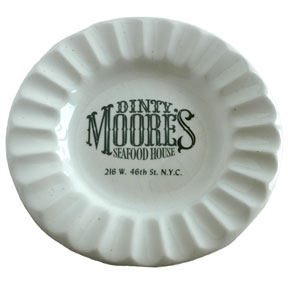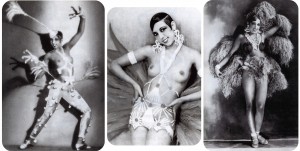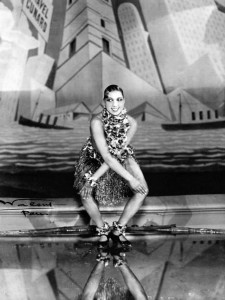St, Patrick’s Day has come and gone and tons of nasty corned beef and cabbage have been consumed. Irish bacon and greens was the traditional holiday dish in Ireland. This got converted to corned beef and cabbage in the United States (HG doesn’t know when). Anyway, today’s inebriated Paddy’s Day revelers eat stringy corned beef (injected with lots of chemical tenderizer), limp cabbage and sadly overdone boiled potatoes. HG’s late Mom would comment: “Feh!!”. There was a time when corned beef and cabbage was a gourmand dish and it was served at Dinty Moore’s, an Irish restaurant on W. 46th Street in New York’s theater district. James “Dinty” Moore opened the restaurant in the 1920’s. Closed in the early 70’s. If Lindy’s and the Stork Club were identified with Walter Winchell, the powerful columnist and radio personality, Dinty Moore’s was identified with Louis Sobol of the Journal-American, the kindest and gentlest of the Broadway columnists. James Moore was the favorite restaurateur of the theatrical and sporting gentry because he defied Prohibition. He ignored it. It was always business as usual at Dinty Moore’s. Moore was often hauled into court but he paid his fines with a smile and kept serving good strong spirits. As the years rolled by, Moore recognized the fact that many of his customers were Jewish. He added gefilte fish (much better than HG’s Mom’s version) to the menu and the Irish lamb stew, beef stew and liver and onions were always made with kosher products. (The rasher of bacon that accompanied the liver and onions was decidedly non-kosher). Prices were high but were paid uncomplainingly because everything served was of the highest quality, plainly cooked and not disguised by intricate sauces. The signature dessert was rice pudding. It was sublime. It was a favorite of Jimmy Cannon, the eloquent sports columnist. A number of generations have grown up seeing Dinty Moore’s Beef Stew on supermarket shelves. No connection with the restaurant and HG doubts if it tastes anything like the wonderful New York food HG consumed at Dinty’s.
Dinty Moore’s: Irish/Jewish and All Good
March 19th, 2014 § 4 comments § permalink
University Place Free Association Part II: Ivan Black and Barry Gray VS. Walter Winchell and the Stork Club
June 9th, 2013 § 2 comments § permalink
In 1951 Ivan Black, the press agent for the Cafe Society clubs, became involved in a bitter battle with Walter Winchell, the all-powerful columnist and radio personality. Josephine Baker, the New York raised, African American dancer who had become one of the most famous entertainers in France, went to the Stork Club — at the time, one of New York’s top clubs and celebrity hangouts. Ms. Baker felt she received rude service because of her race and she made her displeasure known. A radio talk show guy, Barry Gray, took up Baker’s cause and criticized Sherman Billingsley, the Stork Club proprietor. Billingsley was a Winchell pal (WW had a nightly table in the Club’s super-exclusive Cub Room). The battle was on: Barry Gray and Ivan Black VS the Stork Club and Walter Winchell. WW accused Baker of fascist sympathies and communist ties. (Baker sued WW for defamation — but the timid State Department refused her a visa for some years so she was unable to take the suit to court). WW characterized Barry Gray and Ivan Black (who was also the press agent for the restaurant where Gray broadcast) as “commie sympathizers.” In WW’s columns, Gray was ” Borey Pink” and Black was “Ivan Pink.” Such was Winchell’s power that Gray was hounded out of New York. He relocated to Miami where he was very successful and later returned to New York as a popular (and politically conservative) radio gabber. Today, he is acknowledged as the “Father of Talk Radio.” Ivan, a gentle and scholarly Harvard graduate, had some business reverses but survived. The Ivan Black papers at the New York Public Library (some 55 boxes of press releases, clippings, photos and musical scores) are an invaluable historical source for the night club and jazz scene in New York (1937-1978).
Winchell? Television destroyed him. His TV show was a flop. Soon his radio broadcast and column disappeared. With chagrin, he watched his old rival, Ed Sullivan, become a TV icon. (Yes, WW did voice overs on “The Untouchables” TV show but that was just nostalgia shtick). WW died, quite forgotten, age 74. HG is ambivalent about WW. Winchell liked the prose HG contributed to his column and gave HG clients favorable mention. HG’s career as a press agent got a jump start when Winchell printed, in bold face, a prose poem HG authored. WW sent HG a note: “Keep it comin’, keed–WW.” And that’s what HG has done for many a year.
As for Abel “Strange Fruit” Meeropol who was mentioned in Part I of the University Place posts: He and his wife adopted the two orphaned young sons of atom spies Julius and Ethel Rosenberg. Both boys grew up to be college professors. Their childhood with the Meeropols was a happy one. Abel, they recall, was a master of comic improvisations and impersonations. He kept them laughing. After the torment that those boys went through, HG is certainly thankful for that.
Proud HG
October 10th, 2011 § 0 comments § permalink
In case you HG followers hadn’t guessed, the post entitled “Oh My!” was written by SJ. This is a man who can taste and write and convey tastes in words. HG is proud and fortunate. When HG was a Broadway press agent (back in the dark ages) columnist Walter Winchell was the acknowledged media king. In that era before television, WW’s newspaper column and radio program reached millions, influenced government policy and made and broke careers. When HG sent his first contribution to the Winchell column, WW printed it and responded in a brief note: “Keep ’em coming, Keed–WW.”
And, so HG says to SJ: “Keep ’em coming, Keed.”


